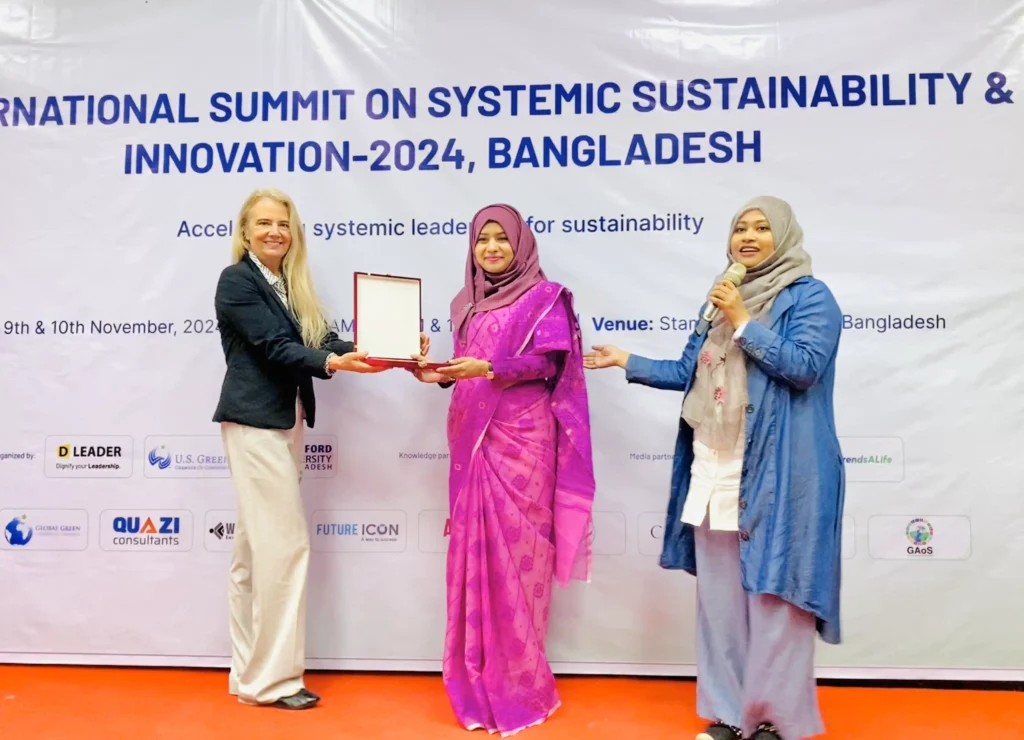Discover the importance of systemic sustainability and innovation in overcoming global challenges, as highlighted in the International Summit 2024. Learn actionable insights to lead responsibly and drive lasting change.
In an ever-evolving world, the need for systematic sustainability and innovation has become more pressing than ever. As traditional approaches fall short in addressing complex global challenges, it’s time to embrace fresh perspectives and solutions. This urgency was the driving force behind the International Systemic Sustainability and Innovation Summit 2024, a groundbreaking event held at Stamford University in Bangladesh.
This two-day summit, organized jointly by DLeader and the US Green Chamber of Commerce, served as a platform for thought leaders, innovators, and students to collaborate and explore pathways toward a more sustainable and innovative future.
A Platform for Change: The Summit’s Purpose and Vision
The summit’s goal was clear: to inspire and equip participants with the tools and knowledge to move beyond conventional approaches. With sustainability and innovation at the forefront, the event sought to highlight:
The interconnected nature of environmental, social, and technological challenges.
The critical role of leadership in driving systemic change.
The importance of preparing the next generation to take on future challenges.
The event welcomed an impressive lineup of speakers, including academics, industry leaders, and sustainability advocates, who brought diverse insights and expertise to the table.
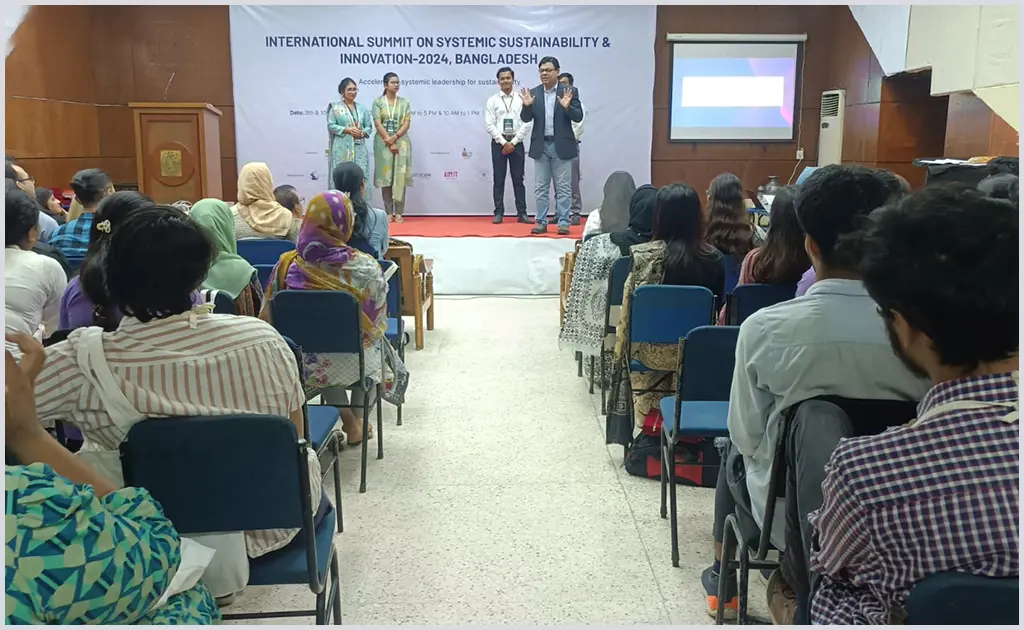
Day One Highlights: Setting the Stage for Innovation
The summit commenced with an inaugural session graced by distinguished guests:
Dr. Moniruzzaman, Vice-Chancellor of Stamford University, as the chief guest.
Dr. Md. Yunus Mia, Vice-Chancellor of Stamford University, as the special guest.
The keynote address was delivered by Michelle Thatcher, CEO of the US Green Chamber of Commerce, who emphasized the urgency of adopting systemic sustainability as a global imperative. Her speech set the tone for the day, urging participants to think beyond conventional solutions and harness the power of innovation.
Panel Discussions and Key Insights
The first day featured an engaging series of panel discussions with notable speakers, including:
Taufiqur Rahman, Aspire to Innovation
Yusuf Ifti, CEO of Future Icon
Tahera Islam Samida, Wellness Trainer at Samidas Garage
AKM Mahmood Haque, Leadership Trainer
These panelists delved into the multifaceted nature of systemic sustainability, highlighting how technology, leadership, and collaboration can address pressing global issues. Key insights included:
The necessity of aligning business goals with environmental and social responsibility.
The role of leadership in fostering a culture of innovation and accountability.
Practical strategies for embedding sustainability into organizational practices.
The discussions underscored that systemic sustainability isn’t just about addressing environmental challenges—it’s about creating resilient systems that support people, economies, and ecosystems in harmony.
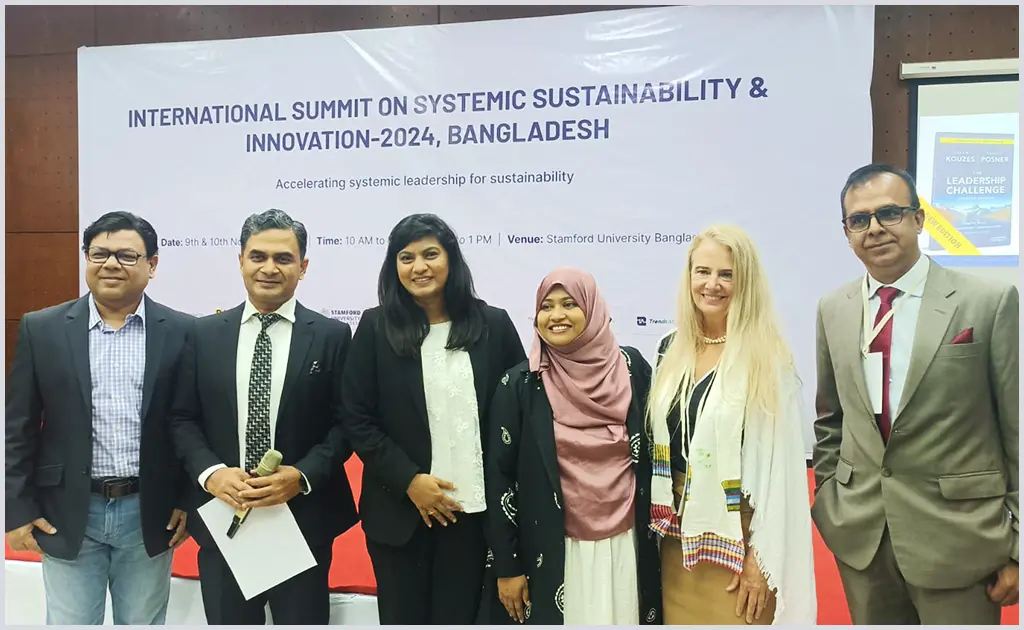
Day Two Highlights: Empowering Future Leaders
The second day of the summit shifted its focus toward leadership development and student engagement. Esteemed speakers included:
Maria Jos Subilara, CEO of Impact UK
Shariful Islam, South Asia Regional Director of Impact
Md. Masum Billah, Joint Editor of Share Biz Karcha
Abdullah M. Ferdous Khan, Think Safety Bangladesh
Dr. ANM Shafiqul Alam Shaheen, CEO of Westmark
Moksed Alam, Corporate Officer at Banglalink
Laila Nazneen, Head of HR at Star Cineplex
Fostering Leadership for Systemic Change
This day’s discussions focused on the attributes and skills needed to lead in an increasingly complex world. Speakers emphasized the importance of systemic thinking, ethical decision-making, and the ability to inspire teams and communities.
Shabnam Mostari, founder of DLeader and systemic sustainability trainer, provided a compelling perspective on the future of innovation:
“Innovation in the days to come will be out of the box and systematic. We are emphasizing systemic sustainability and working to develop future leadership from students who will lead the world of tomorrow.”
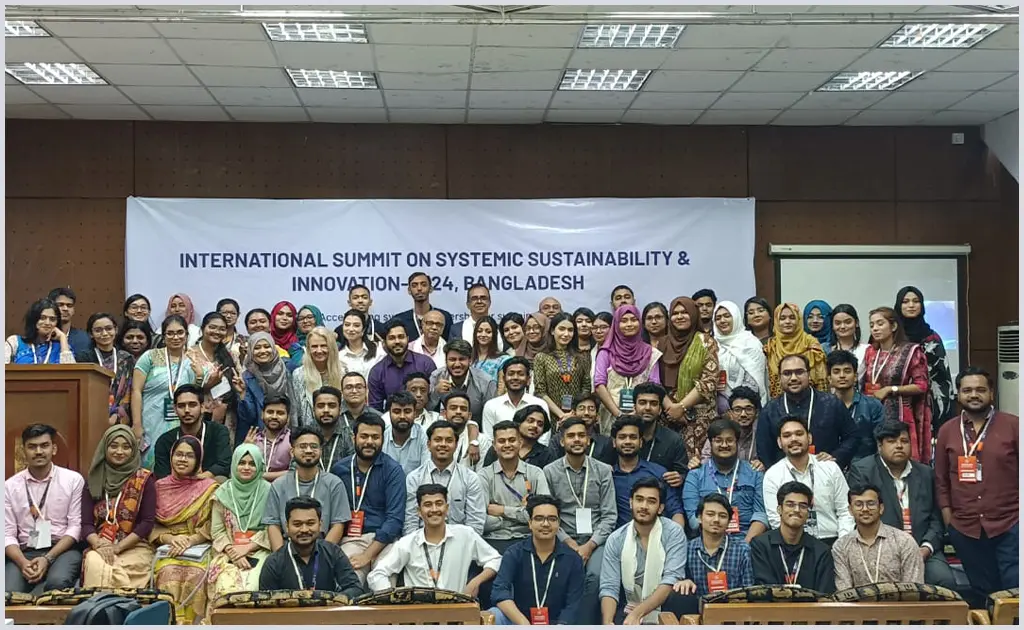
Student Engagement: Building Tomorrow’s Innovators
A standout feature of the summit was its engagement with over 100 students, who actively participated in workshops, discussions, and a special model-presentation session. Eight groups of students showcased innovative ideas through models designed around systemic sustainability, including:
Future Bangladesh
Eco Field
Green City
Smart Bangladesh (the winning model)
Green Model Town
Choose Is Yours
Eco Bangladesh
Spotlight on Smart Bangladesh
The Smart Bangladesh model emerged as the judges’ favorite for its practical and forward-thinking approach to sustainable urban development. The team envisioned a future where technology and green infrastructure work hand in hand to create livable, eco-friendly cities.
The students highlighted the immense importance of environmentally friendly innovation in ensuring sustainability for future generations. Their ideas reflected a deep understanding of the interconnected nature of economic growth, environmental health, and social well-being.
Key Takeaways from the Summit
1. Systemic Sustainability Is Essential
Speakers and panelists repeatedly emphasized that piecemeal solutions are no longer sufficient. A systemic approach, which considers the interconnectedness of environmental, economic, and social systems, is critical to achieving lasting sustainability.
Michelle Thatcher aptly summed it up:
“There is no alternative to systemic sustainability to build the future world. We must ensure the fair use of natural resources while fostering leadership that prioritizes our planet.”
2. Leadership Is the Catalyst for Change
The summit underscored the pivotal role of leaders in driving sustainability and innovation. Future leaders must be equipped to navigate complexities, inspire collaboration, and champion ethical practices.
3. Innovation Must Be Purposeful
Innovation should go beyond technological advancements—it must address real-world challenges and create value for society and the environment. The summit’s student presentations showcased how creative thinking can yield practical, impactful solutions.
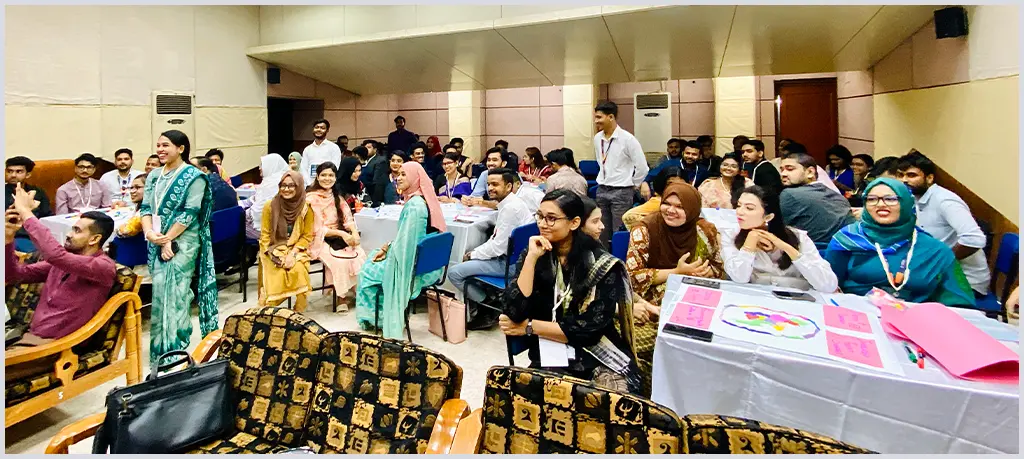
The Role of Collaboration in Achieving Sustainability
One of the summit’s greatest strengths was its collaborative nature. By bringing together academia, industry, and the non-profit sector, the event demonstrated how partnerships can amplify impact.
Organizations like DLeader and the US Green Chamber of Commerce play a crucial role in fostering such collaborations. Through their combined efforts, they are creating a global community dedicated to sustainability and innovation.
Embracing Systemic Sustainability
The International Systemic Sustainability and Innovation Summit 2024 was more than just an event—it was a movement. It inspired attendees to think beyond the ordinary, act with purpose, and collaborate for a better future.
As Dr. Md. Yunus Mia noted in the closing session:
“Students have achieved a lot in this two-day event. They now have the guidance they need to lead the world of tomorrow and build a better future.”
For all of us, the message is clear: systemic sustainability and innovation are not optional—they are essential. Whether you’re a leader, a student, or a changemaker, now is the time to take action.
Let’s work together to build a world that values sustainability, fosters innovation, and embraces the power of collective impact. The future depends on the choices we make today.
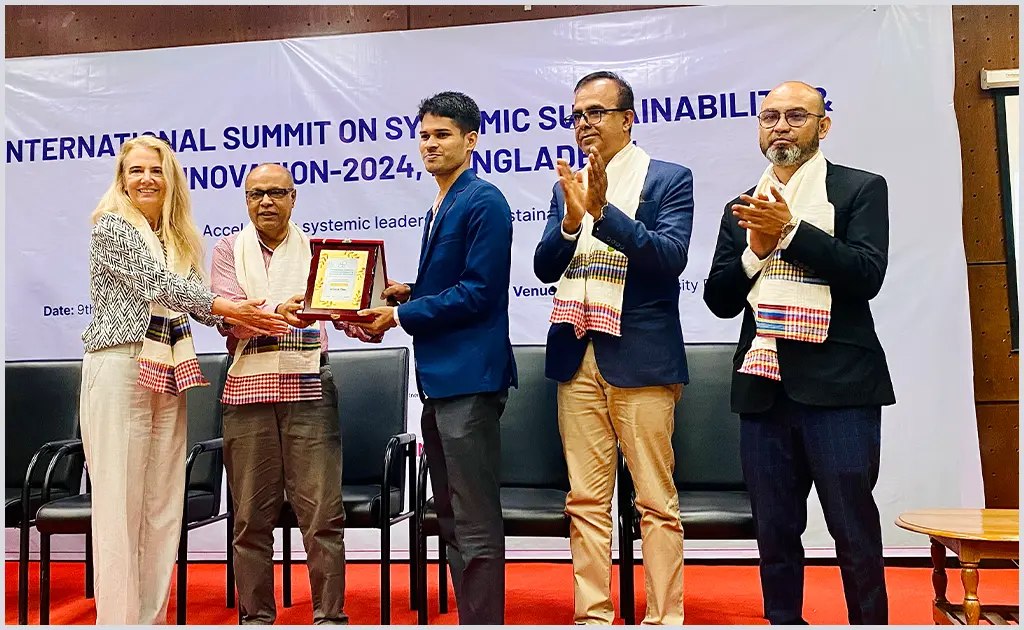
Steps Toward a Systemically Sustainable Future
The summit provided a wealth of ideas and insights, but the true measure of success lies in the actions that follow. Here are some concrete steps individuals, organizations, and communities can take to build a systemically sustainable future:
1. Foster Sustainability Education
Education is the cornerstone of systemic sustainability. Institutions like Stamford University are already leading the way by hosting events that engage students in real-world challenges. To amplify these efforts:
- Integrate sustainability into curricula across disciplines, emphasizing its relevance in various fields.
- Promote interdisciplinary collaboration, allowing students and professionals to approach problems from multiple perspectives.
- Offer hands-on opportunities, such as workshops, internships, and innovation challenges, to apply theoretical knowledge to practical scenarios.
2. Embrace Innovation with Purpose
Innovation must be more than a buzzword—it should be a driving force for good. Leaders and organizations can:
- Focus on solutions that address pressing challenges, such as climate change, resource scarcity, and social inequality.
- Invest in green technologies and practices that minimize environmental impact.
- Encourage a culture of continuous improvement, where employees and stakeholders are empowered to think creatively and propose new ideas.
3. Build Collaborative Ecosystems
No single entity can solve systemic issues alone. Collaboration across sectors is essential. By fostering partnerships like the one between DLeader, the US Green Chamber of Commerce, and Stamford University, we can:
- Pool resources, knowledge, and expertise to address large-scale challenges.
- Strengthen public-private partnerships that align business objectives with societal needs.
- Encourage community engagement, ensuring that all stakeholders, including marginalized groups, have a voice in shaping solutions.
4. Develop Leadership with a Sustainability Mindset
Leadership is the key to driving systemic change. A sustainability mindset equips leaders to think long-term, act ethically, and inspire others to follow suit. Leadership development programs should:
- Cultivate systems thinking, helping leaders see the bigger picture.
- Emphasize values-based leadership, ensuring decisions align with ethical and environmental priorities.
- Provide mentorship opportunities, connecting emerging leaders with seasoned professionals who can guide their growth.
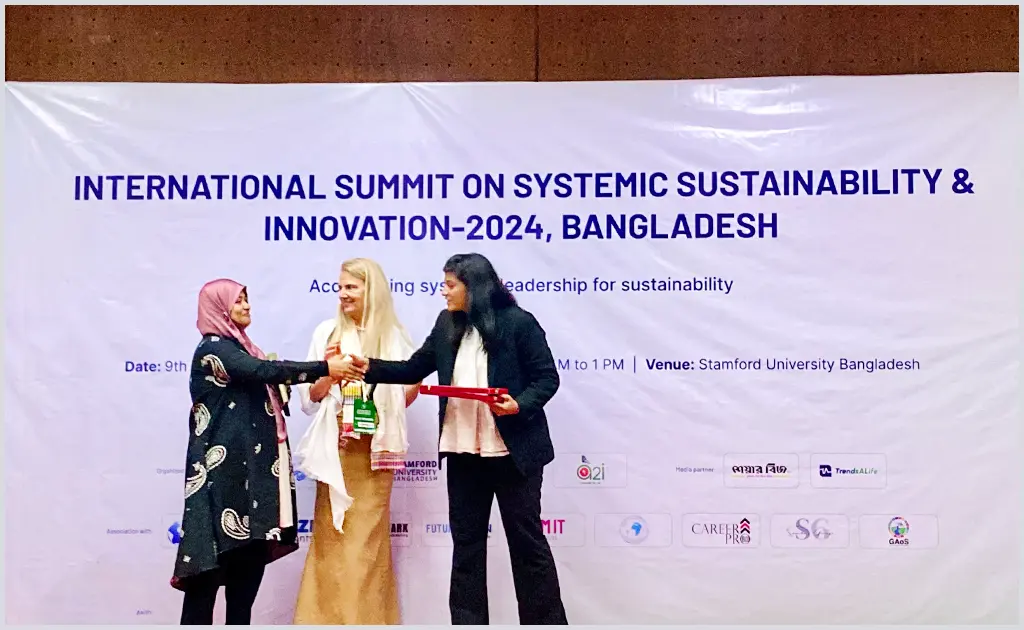
DLeader’s Commitment to Systemic Sustainability
At the heart of the summit’s success was the unwavering commitment of DLeader, a global leadership coaching firm dedicated to empowering leaders at every level. DLeader recognizes that systemic sustainability is not just a goal—it’s a way of thinking and acting that permeates every aspect of leadership.
How DLeader is Making an Impact
- Leadership Coaching: DLeader works with leaders to help them integrate sustainability principles into their decision-making and strategies.
- Training Programs: Through tailored workshops and seminars, DLeader equips teams with the skills needed to tackle systemic challenges.
- Global Advocacy: DLeader actively participates in forums and summits to promote the importance of sustainability in leadership.
- Empowering the Next Generation: By engaging with students and young professionals, DLeader ensures that the leaders of tomorrow are prepared to create a sustainable future.
The Role of Events Like the Summit in Driving Change
Events like the International Systemic Sustainability and Innovation Summit play a critical role in building momentum for systemic change. They serve as platforms for:
- Knowledge Exchange: Attendees gain insights from experts and peers, broadening their understanding of sustainability and innovation.
- Inspiration: Success stories and innovative ideas spark creativity and motivate action.
- Networking: Participants form connections that lead to future collaborations and initiatives.
By hosting and participating in such events, organizations and individuals can amplify their impact and contribute to a global movement toward sustainability.
Your Role in Systemic Sustainability
While the summit was a significant step forward, the journey toward systemic sustainability and innovation continues—and everyone has a role to play. Here are a few ways you can contribute:
- As an Individual: Adopt sustainable practices in your daily life, support businesses that prioritize sustainability, and advocate for change in your community.
- As a Leader: Champion systemic sustainability within your organization, empower your team to innovate responsibly, and prioritize long-term impact over short-term gains.
- As a Student or Educator: Engage in learning opportunities that emphasize sustainability, share knowledge with peers, and explore innovative solutions to global challenges.
Conclusion: Moving Beyond Conventionality
The International Systemic Sustainability and Innovation Summit 2024 was a call to action for individuals and organizations alike. It underscored the urgency of moving beyond conventional approaches to address the complexities of today’s world.
Through systemic sustainability and purposeful innovation, we can create a future that is not only resilient but also equitable and thriving. As the summit demonstrated, achieving this vision requires collaboration, leadership, and a commitment to continuous improvement.
Let’s carry forward the lessons of the summit and work together to build a world where sustainability and innovation are not exceptions, but the norm.
What steps will you take today to contribute to a sustainable and innovative future? Let’s make it happen, together.
